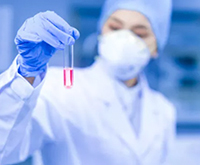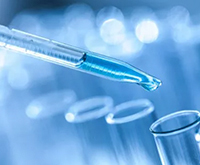Thyroglobulin (Tg)
Thyroglobulin is a 660 kDa, a dimeric glycoprotein produced by the follicular cells of the thyroid and released into the residual cavity of the thyroid follicles; the entire process happens in the thyroid gland. TSH, iodine deficiency in the thyroid, and thyroid-stimulating immunoglobulin can stimulate Tg.
A thyroglobulin test mainly acts as a tumor marker test to help guide thyroid cancer treatment.
Tg can distinguish congenital complete thyroid defect and hypothyroidism. Thyroglobulin is also considered a specific marker of thyroid body integrity.
It is a tumor marker for differentiated thyroid cancer (DTC) and can use as an essential reference index for follow-up patients with differentiated thyroid cancer after treatment. It can also distinguish subacute thyroiditis from pseudo thyrotoxicosis.

Thyroglobulin (Tg) Products
| Antibody | Application |
| Humanized anti-human Tg mAb | For immunodiagnostic: ELISA, LFA, CLIA |
Thyroglobulin Intro
Thyroglobulin (Tg) is a macromolecular glycoprotein secreted by thyroid follicular epithelial cells, most synthesized by thyroid cells and released into the remnant cavity of thyroid follicles. Factors such as TSH, iodine deficiency in the thyroid, and thyroid-stimulating immunoglobulin can stimulate its production. In patients with congenital hypothyroidism, detection of Tg can differentiate between complete thyroid defect and thyroid hypoplasia. Thyroglobulin is also considered a specific marker of thyroid body shape integrity. It is a tumor marker of differentiated thyroid cancer (DTC) and can be used as an important reference index for follow-up patients with differentiated thyroid cancer after treatment. It can also use to differentiate subacute thyroiditis from pseudothyrotoxicosis.
Thyroglobulin Antibody
Thyroglobulin antibody is a common autoantibody in the serum of patients with autoimmune thyroid disease, mainly composed of IgG1, IgG2, and IgG4, and a small part of IgA and IgM. After thyroglobulin antibodies bind to thyroglobulin, they can interact with the bound antibodies through Fc receptors, activate NK cells, and attack target cells, destroying thyroid cells. It is generally believed that thyroglobulin antibodies have no damaging effect on the thyroid gland.
- Cardiac Markers
-
Tumor Marker
-
PGII
-
G17
- CA50
-
CA125
- CA242
-
CA15-3
- CA19-9
- CA72-4
-
Pepsinogens I (PGI)
-
Human Epididymis 4 (HE4)
- Prostate-Specific Antigen (PSA)
- Squamous Cell Carcinoma (SCC)
- Neuron-Specific Enolase (NSE)
- Cytokeratin 19 Fragment (CYFRA21-1)
- Human Progastrin-releasing Peptide (ProGRP Tumor Marker)
- Protein Induced by Vitamin K Absence or Antagonist-II (PIVKA II Tumor Marker)
- Alpha-fetoprotein(AFP)
-
CEA
-
Human Chitinase 3-like 1
-
PGII
- Inflammatory Marker
- Infectious Disease
- Hormones
- Thyroid Function
- Glucose Metabolism
- Bone Marker
- Others
-
Heterophilic Blocking Reagent
- Animal Diagnostics

















